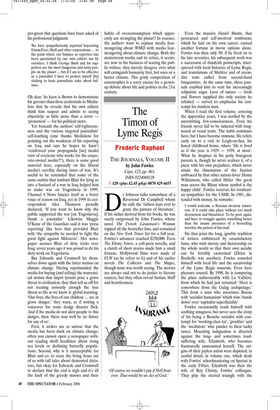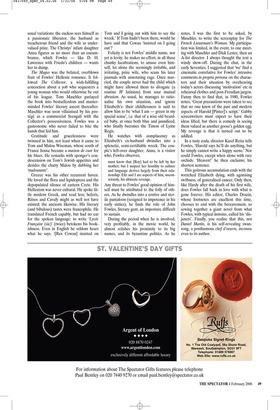The Timon of Lyme Regis
Frederic Raphael
THE JOURNALS, VOLUME II by John Fowles
Cape, £25, pp. 463, ISBN 0224069128
✆ £20 (plus £2.45 p&p) 0870 429 6655 Dr Johnson talks somewhere of a Reverend Dr Campbell whom he calls the ‘richest man ever to graze the pasture of literature’. If his riches derived from his books, he was surely outgrossed by John Fowles, whose novel The French Lieutenant’s Woman topped all the bestseller lists, and remained on the New York Times list for a full year. Fowles’s advances reached $250,000. Even The Ebony Tower, a soft-porn novella, and a clutch of short stories made him a small fortune. Hollywood films were made of FLW (as he refers to it) and of his earlier novels The Collector and The Magus, though none was worth seeing. The movies are always said not to do justice to literary sources, but they often reveal fustian, bluff and heartlessness. Even the massive Daniel Martin, that protracted and self-involved tombstone which he laid on his own career, earned another fortune in movie options alone. Fowles was then only 50; if he lived on to his late seventies, his subsequent work was a succession of dandyish postscripts, interspersed with local histories of Lyme Regis, and translations of Molière and of recondite texts culled from second-hand bouquinistes. At the same time, these journals enabled him to vent his increasingly solipsistic angst. Love of nature — birds and flowers supplied the only society he relished — served to emphasise his contempt for modern man.
When I read the first volume, covering the apprentice years, I was nettled by the unremitting Jew-consciousness. Even his friends never fail to be ticketed with longnosed or venal traits. The habit continues here, but I have become immune. He refers early on to a visit to Leigh-on-Sea, his hated childhood home, where ‘life is lived as if the year is 1929 — 1939, at most’. What he despises in his petty bourgeois parents is, though he never realises it, of a piece with his own prejudices, which never attain the dimensions of the fascism embraced by that other nature-lover Henry Williamson, who called Hitler ‘the great man across the Rhine whose symbol is the happy child’. Fowles reserves his totalitarian sympathies for the USSR. In 1981, distended with money, he remarks:
I would welcome a Russian invasion tomorrow, if it could take place without too much destruction and bloodshed. To be poor again, and have to struggle against something better than the insane pressures of a bestselling novelist, the poison of fan mail.
He thus joins the long, ignoble tradition of writers embittered by unsatisfactory fame, who wish slavery and dictatorship on the whole world so that their own accidie can be forcibly cauterised (Drieu la Rochelle was another). Fowles consoled himself with local life and the curatorship of the Lyme Regis museum. Even here pleasure soured. By 1990, he is comparing the place unfavourably with La Vallière, from which he had just returned: ‘Here is somewhere from the Gulag archipelago.’ This from a man who associates Russia with ‘socialist humanism’ which wins ‘hands down’ over ‘capitalist superficiality’.
Fowles occasionally reads himself with scathing smugness, but never sees the irony of his being a Bennite socialist with contempt for ‘working-class tat’, ‘grockles’ and the ‘mediators’ who pander to their tacky tastes. Mounting indignation is directed against the longand sometimes loudsuffering wife, Elizabeth, who becomes frustratedly unmounted herself. The origins of their joyless union were depicted, in zestful detail, in volume one, which dealt with Fowles’ schoolmastering on Spetsai in the early Fifties. Elizabeth was then the wife of Roy Christy, Fowles’ colleague. They play the eternal triangle with the usual variations: the cuckoo sees himself as a passionate liberator, the husband as treacherous friend and the wife as undervalued prize. The Christys’ infant daughter Anna figures as no more than an encumbrance, which Fowles — like D. H. Lawrence with Frieda’s children — wants her to dump.
The Magus was the belated, overblown fruit of Fowles’ Hellenic romance. It followed The Collector, a wish-fulfilling concoction about a yob who sequesters a young woman who would otherwise be out of his league. Tom Maschler parlayed the book into bestsellerdom and masterminded Fowles’ literary ascent thereafter. Maschler was soon villainised by his protégé as a commercial Svengali with the Collector’s possessiveness. Fowles was a gastronome who never failed to bite the hands that fed him.
Gratitude and gracelessness were twinned in him, not least when it came to Tom and Malou Wiseman, whose south of France house became a maison de cure for his blues. He remarks with sponger’s condescension on Tom’s Jewish appetites and derides the chatty Malou by dubbing her ‘maloutante’.
Greece was his other recurrent haven. He loved the flora and lepidoptera and the depopulated silence of eastern Crete. His Hellenism was never cultural. He spoke little modern Greek, and read less; Seferis, Ritsos and Cavafy might as well not have existed; the ancients likewise. His literary (and bibulous) tastes were francophile. He translated French capably, but had no ear for the spoken language: to write ‘Lycée FranVaise (sic)’ (twice) betokens his bookishness. Even in English he seldom hears what he says. ‘[Rex Cowan] insisted on Tom and I going out with him to see the wreck.’ If Tom hadn’t been there, would he have said that Cowan ‘insisted on I going out’?
Felicity is not Fowles’ middle name, nor yet is levity: he makes no effort, in all these chunky lucubrations, to amuse even himself, let alone the seemingly irritable, and irritating, prize wife, who scans his later journals with annotating rage. Once married, the couple never had the child which might have allowed them to divagate (a routine JF latinism) from sour mutual abrasion. As usual, he manages to rationalise his own situation, and ignore Elizabeth’s: their childlessness is said to allow him to be ‘what I am — green in my special sense’, i.e. that of a wise old bearded baby, at once both blue and jaundiced, who finally becomes the Timon of Lyme Regis.
He watches with complacency as Elizabeth’s ex-husband dwindles into a splenetic, semi-certifiable wreck. The couple’s left-over daughter, Anna, is a visitor who, Fowles observes,
must know that [Roy] had to be left by her mother; but I suspect her hostility to culture and language derives largely from their relationship. Eliz and I are aspects of him, unconsciously, his ultimate revenge.
Any threat to Fowles’ good opinion of himself must be attributed to the folly of others. As he dwindles into a costive and sterile pantaloon (resigned to impotence in his early sixties), he finds the role of John Fowles, literary gent, an imposture difficult to sustain.
During the period when he is involved, very profitably, in the movie world, he almost relishes his proximity to its big names, and its byzantine politics. As he notes, I was the first to be asked, by Maschler, to write the screenplay for The French Lieutenant’s Woman. My participation was limited, in the event, to one meeting with Maschler and Dick Lester, then an A-list director. I always thought the text a windy show-off. During the chat, in the early Seventies, I suggested that ‘we’ find a cinematic correlative for Fowles’ intrusive comments in propria persona on the characters and their situation by overhearing today’s actors discussing ‘motivation’ etc in rehearsal clothes and post-Freudian jargon. Funny then to find that, in 1980, Fowles notes, ‘Great precautions were taken to see that no one knew of the past and modern aspects of Harold [Pinter]’s script.’ Gabby screenwriters must expect to have their ideas lifted, but there is comedy in seeing them valued as another goose’s golden egg. My revenge is that it turned out to be addled.
In a tasty coda, director Karel Reisz tells Fowles, ‘Harold says he’ll do anything, but he simply cannot write a happy scene.’ Nor could Fowles, except when alone with rare orchids: ‘Heaven!’ he then exclaims; his shortest sentence.
This goitrous accumulation ends with the wretched Elizabeth dying, with agonising swiftness, of generalised cancer. Only then, like Hardy after the death of his first wife, does Fowles fall back in love with what is gone forever. His editor, Charles Drazin, whose footnotes are excellent this time, chooses to end with the bereavement, so sewing together a giant novel from what Fowles, with typical latinitas, called his ‘disjuncts’. Finally, you realise that this, not Daniel Martin, is his self-revealing swansong, a posthumous chef d’oeuvre, inconnu even to its author.






























































































































 Previous page
Previous page